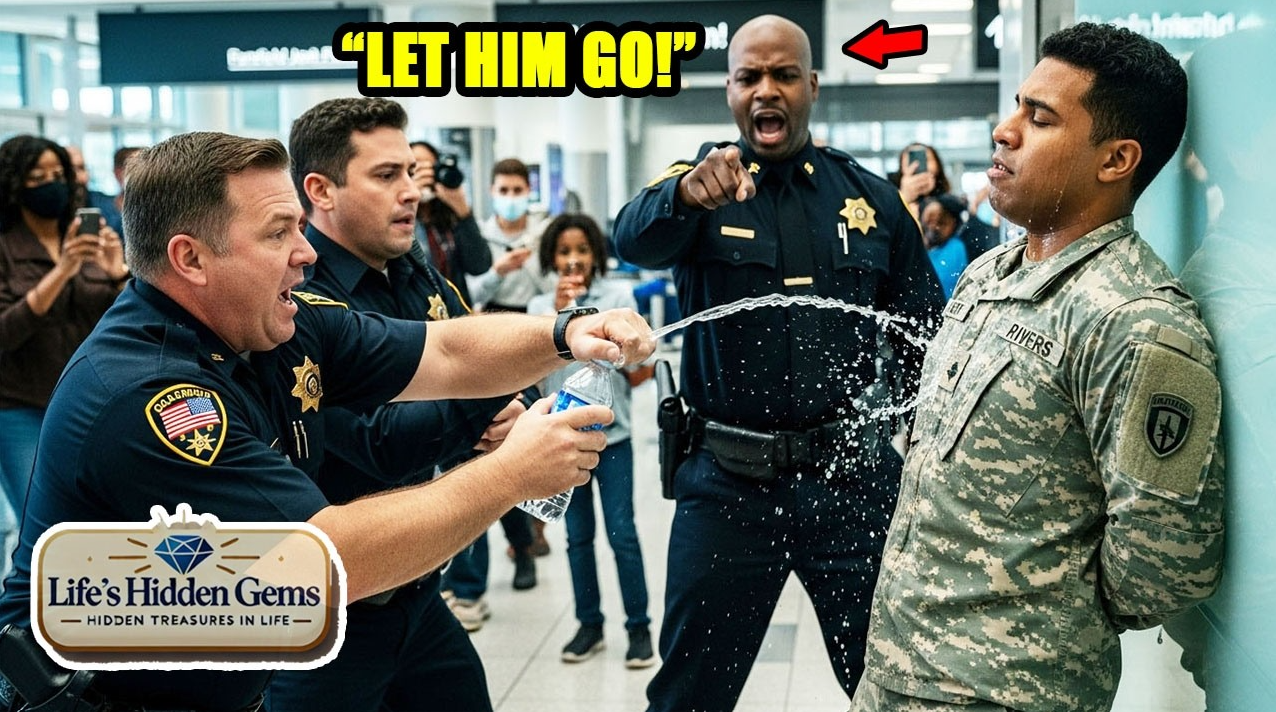Inspirational
Cops Humiliate Black Soldier at Airport Then Hear One Command That S

“Hey, step away from that bag. Now.”
Jamal Rivers turned slowly, both hands raised. The Atlanta airport buzzed around him, but in that moment, it felt like a silent battlefield. Two white officers closed in, eyes already judging.
“I’m Staff Sergeant Jamal Rivers. Just landed from Ramstein.”
Officer Beckett snorted.
“That so? You always walk around in a stolen uniform?”
“I earned this.”
“Sure you did.”
People began to stare. A child pointed. A woman clutched her purse tighter. Jamal stayed calm, but inside, fury built. He’d been welcomed home before—with cheers. Now, with suspicion.
“I have my ID. Check it.”
“We don’t need to. You fit the description.”
“Of what?” Jamal shot back. “A soldier… or just a Black man in uniform?”
Beckett yanked Jamal’s duffel from his shoulder. Uniforms spilled across the floor—military documents, family photos, his mother’s letter.
Haynes smirked.
“Fake. Just like you.”
Jamal’s fists clenched, but his voice didn’t rise.
“You’re making a mistake.”
The officers ignored him. Phones started recording. Then another. A child’s voice broke through the tension.
“Mommy, why are they hurting the hero?”
Gasps. Beckett shoved Jamal into the wall.
“You’re under arrest.”
Jamal’s voice trembled—not with fear, but shame.
“Is this how America thanks its soldiers now?”
The crowd stood still. No one moved. No one helped.
Until—
“Unhand that man.”
A voice cut through the air like thunder.
The crowd parted as a tall Black officer stepped forward, badge gleaming. Captain Andre Maxwell.
“I said unhand him. That’s a direct order.”
Haynes froze. Beckett stiffened.
“Sir, we were following protocol—”
“No,” Maxwell snapped. “You were following your prejudice.”
Jamal’s arms dropped free. He stood tall, but his eyes burned. Maxwell turned to him.
“Are you hurt, Sergeant?”
Jamal nodded once.
“Just tired, sir. Tired of this happening again… and again.”
Phones were still filming. A woman whispered, “Is he someone important?”
Another man answered, “He’s a soldier. That should’ve been enough.”
Maxwell glared at the officers.
“You two—my office. Now.”
And for the first time, even the silence tasted like justice.
Inside the airport’s internal security room, tension wrapped the walls like smoke. Jamal stood in the corner, arms crossed. Maxwell addressed Chief Granger as the two officers sat pale and sweating.
“They tackled a decorated soldier without cause. They humiliated him in public.”
Granger’s eyes narrowed.
“I saw the footage.” He turned to the officers. “You didn’t even ask for his ID.”
Beckett stammered.
“Sir, we—he looked like—like a Black man in uniform.”
Haynes flinched.
“You falsified reports, used unnecessary force, and worse—you disgraced this department.”
Jamal spoke quietly.
“They called me boy.”
Granger’s face darkened.
“Effective immediately, both of you are suspended. Pending full investigation.”
No cheers. No applause. Just the weight of consequences finally landing.
As the officers left, heads lowered, Jamal stepped forward.
“One thing,” he said. “Next time you see a Black man in uniform… show some respect.”
The door shut behind them. Maxwell exhaled. Granger walked over.
“We owe you more than words.”
“I don’t want an apology,” Jamal said. “I want this to stop—for every kid watching from the crowd who looks like me.”
He picked up his duffel, folded the photo of his mother, and walked toward the exit.
A janitor nodded silently. A gate agent gave a salute. No noise—but something had shifted.
Outside, the sun cut through the clouds. And for the first time that day, Jamal smiled, just a little.
“They didn’t break me,” he whispered. “They saw me.”
Jamal Rivers didn’t fight for applause. He fought for dignity. His story reminds us that respect shouldn’t depend on skin color or uniform. Injustice hides in silence, but courage breaks that silence wide open.
